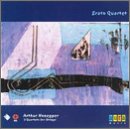| All Artists: Honegger, Matisse Title: Honegger: Complete String Quartets Members Wishing: 0 Total Copies: 0 Label: Aura Classics Release Date: 6/27/2000 Album Type: Import Genre: Classical Styles: Chamber Music, Historical Periods, Classical (c.1770-1830) Number of Discs: 1 SwapaCD Credits: 1 UPCs: 801439041721, 697833004178 |
Search - Honegger, Matisse :: Honegger: Complete String Quartets
 | Honegger, Matisse Honegger: Complete String Quartets Genre: Classical
|
Larger Image |
CD Details |
CD ReviewsHEARTFELT HONEGGER Melvyn M. Sobel | Freeport (Long Island), New York | 01/22/2003 (5 out of 5 stars) "Established foremost in the musical community for his orchestral, symphonic and vocal/oratorio output, it seems hardly surprising, then, that these three string quartets of Arthur Honegger (1892-1955) have been notoriously neglected. Triggering this neglect might be the fact that Honegger chose to write very few chamber works, rather disengaging from the form to concentrate on larger venues.
That said, I must admit that the composer might have done himself, and us, a disservice. As the crux of his chamber output, the three extant quartets are infinitely fascinating and formidable, each tempered by the extraordinary use of an ever-evolving musical vocabulary. The earliest, Quartet for Strings No. 1 (1917), already shows Honegger's penchant for balancing dissonance, chromaticism and melody in a way that creates a delightful frisson. Case-in-point: The juxtapositioning of the very Faure-like opening Appassionato and the second movement Adagio, with its solemn cello recitative and continuous lyrical string meanderings. There is an appealing and overt romanticism here not found in the quartets that follow two decades later. Quartet for Strings No.'s 2 (1936) and 3 (1937) are more distinctly modernistic, the allegros propulsive and discordant, thematic material veering sharply away from melodic involvement. Here we enter the mainstreams of Bartok, Prokofiev and Shostakovich. Remarkable, however, are the somber and thought-provoking adagio movements that form the true compositional cores. Performed with the kind of simpatico and idiomatic panache necessary to reveal these "Beethovenian underproducts," as Honegger called his three quartets, to the fullest possible measure, the Erato ensemble succeeds completely. The sound they produce has been captured intimately and beautifully. [Running time: 64:18]" |

 Track Listings (9) - Disc #1
Track Listings (9) - Disc #1